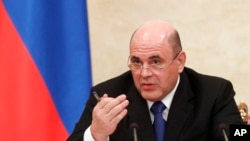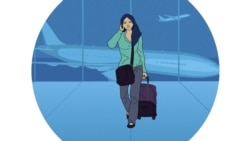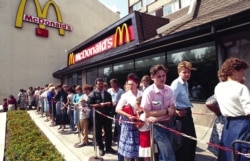Russia joined the list of countries introducing strict measures to combat the spread of the deadly coronavirus from China, in what has emerged as an early test of new Prime Minister Mikhail Mishustin’s government.
On Thursday, Mishustin — in his second week on the job after being plucked from obscurity by President Vladimir Putin in a surprise government reshuffle — unveiled a range of actions to prevent spread of the disease.
Mishustin announced he had ordered Russia’s Far Eastern border with China sealed.
"We have to do everything to protect our people,” he said in remarks carried on state television.
According to Deputy Prime Minister Tatiana Golikova, auto and foot traffic between the countries would soon stop completely in targeted border zones. For now, Russia plans to close 16 of its 25 border points effective at midnight Thursday.
Russia’s Foreign Ministry also suspended issuance of electronic visas to Chinese nationals — Russia’s largest source of tourists in recent years — and discouraged Russian citizens from traveling to China for the time being.
Train service, however, will still be available, at least on direct nonstop rides on the famed Trans-Siberian rail journey between Moscow to Beijing until March 1.
Russia’s national air carrier Aeroflot said it was continuing service for now, but offered passengers extended windows to refund tickets.
By limiting travel corridors, officials appeared to be betting that passengers could still return to their respective homes while providing health officials a way to effectively monitor the disease.
Economic impact
Less clear is the economic impact — tour operators and Russian railways warn losses could be in the hundreds of millions of dollars, depending on how long the new restrictions remain in place.
The restrictions come amid a sudden spike in cases in China, with Chinese officials reporting 7,800 cases and 170 deaths from the coronavirus as of Thursday afternoon.
By contrast, Russian health officials maintain that the government has yet to register a single documented case of the disease.
Yet the Kremlin and businesses were clearly sensitive to public distrust and possible panic.
On Thursday, fast food company McDonald's canceled widely touted plans to introduce a single day of Soviet-era pricing on their food in honor of the 30th anniversary of the restaurant’s flagship opening in Moscow on Jan. 31, 1990.
"For us, there’s no bigger priority than the health of our guests and workers,” Marc Carena, CEO of McDonald's Russia, said in a statement posted on the company's website. Carena explained that the cancellation was linked to a possible outbreak of the disease.
Officials in the far eastern region of Zabailsk also issued a statement that an outbreak of foot-and-mouth disease in cattle and pigs had been registered and resolved. Fifty-eight cattle and 18 pigs with the disease had been destroyed.
Prevention tips
Meanwhile, Russia’s Health Ministry published a list of medications it claimed could help ward off symptoms, including several anti-HIV drugs.
Putin has sought to provide assurances that his new government is gearing up for the worst.
Speaking about the coronavirus in a meeting with cabinet members on Wednesday, Putin called on the government to do everything “to minimize the loss of life” from the virus.
The question,” Putin said, “is how ready we'll be to the challenge.”








